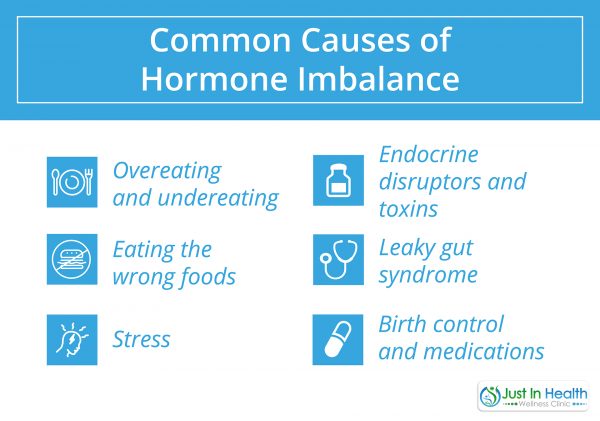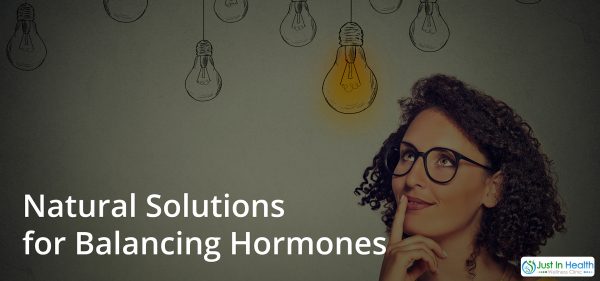Balancing Hormones Naturally

By Dr. Justin Marchegiani
What are Hormones?
Hormones are chemical messengers secreted by our glands in order to maintain our physiological and behavioral functions. The three main classes of hormones are eicosanoids, steroids, and amino acids.
- Eicosanoids regulate inflammation, allergies, and other immune functions; normal childbirth or abortion; contribute to how we perceive pain; regulate cell growth; and control blood pressure, among many more functions.
- Steroids include human sex hormones: androgens (predominantly male hormone: testosterone), estrogens (predominantly female hormone), and progestagens (related to the uterus/menses and maintains pregnancy). These are what differentiate males and females on a biological level, and also support reproduction. Vitamin D is actually a category of steroid as well!
- Amino acids as proteins are the largest component of human muscles, after water. Amino acids are crucial for our bodies to function. Nine amino acids are considered essential, and are only available to humans when taken in as foods. Amino acids play in a key role in nutrient absorption and waste removal. They also help heal wounds, support health organ and artery function, and maintain healthy hair, muscles, and bones.

Symptoms of Hormone Imbalance
Hormones are responsible for our mood, sleep cycle, metabolism, sexual expression, temperature, healthy organ function, and so much more. They depend on complex systems to function correctly. Hormone imbalance has become increasingly common, causing many people to suffer with their weight, mental health, and overall well-being. Here are some common hormone imbalances and their symptoms:
- Polycystic Ovarian Syndrome (PCOS): irregular periods, infertility, acne, weight gain, thinning hair, facial hair, depleted energy, low libido, mood swings, high testosterone.
- Hyperthyroidism/hypothyroidism: fatigue, anxiety, feeling cold, weight gain/loss, brain fog, weakness, insomnia, bulging eyes, dry skin.
- Diabetes: decreased energy, mood swings, unexplained weight changes, tingling or numbness, wounds heal slowly, blurry vision, weakness, excessive hunger.
- Adrenal Fatigue: Brain fog, depleted energy, weight gain, low libido, hair loss, depression, anxiety, sleep issues, lightheadedness, sugar cravings.
- Estrogen Dominance: Weight gain, acne, increased body and facial hair, thinning hair, brittle hair and nails, puffy eyes, water retention, headaches, sugar cravings, carb cravings, decreased energy, fatigue, PMS, constipation, low libido, inflammation, heavy periods, anxiety, stress, panic attacks, depression, irritability.
- Low Testosterone: Muscle loss, weight (fat) gain, infertility, hair loss, low libido, depression, fatigue, decreased energy, irritability, sleep issues, stress.
Click here to consult with a functional medicine doctor for help balancing your hormones!

Common Causes of Hormone Imbalance
Our bodies have not yet adapted to the fast changing pace of our modern world. Even if internally we think we’re doing everything right, external factors that are outside of our control can still alter our hormones.
- Overeating and undereating both affect our hormones. Undereating puts a ton of stress on our bodies and causes hormone imbalances fast.
- Eating the wrong foods can harm your body and your hormones: too many processed foods, GMOs, carbs, sugar, soy, alcohol, unhealthy fats, and other inflammatory foods can all do a number on your hormones.
- Stress, both physical and mental, affect our hormones. This means avoid over-exercising and avoid getting super stressed! When we are chronically stressed, our bodies convert other hormones into cortisol (the stress hormone), throwing our hormones out of balance.
- Endocrine disruptors and toxins in our environment: beauty products, artificial fragrances, plastic products, cleaning supplies, pesticides, and other toxins.
- Leaky gut syndrome: leaky gut and other issues with your microbiome has been shown to make you more susceptible to hormonal imbalances.
- Birth control and medications contain hormone disrupting chemicals that attempt to mimic natural hormones and prevent our bodies from producing our own.

Natural Solutions for Balancing Hormones
While it may not be possible to completely avoid every potential source of harm, there are many ways in which we can support healthy hormone balance by making healthy lifestyle choices.
- Swap processed carbs for healthy fats, avoid under- and overeating, avoid inflammatory foods.
- Limit caffeine: caffeine stresses your hormones.
- Avoid endocrine disruptors: beauty products, perfumes, canned foods, GMOs, pesticides, conventional meat and dairy, plastic water bottles.
- Eat a diet full of colorful organic fruits and veggies, organic meat and eggs, and healthy fats (like coconut oil). Supplement with amino acids to ensure your body is nourished with everything it needs!
- Adaptogen herbs, such as maca and ashwagandha, promote hormone balance and help combat stress. They improve the thyroid’s function, support healthy adrenal glands, and reduce anxiety and depression.
- Keep your cortisol levels balanced by curbing stress through meditation, healing negative emotions, and getting enough sleep
- Supplement with probiotics to support a healthy gut biome, lower inflammation, and boost overall health. Bone broth is also healing for your gut and contains a host of important amino acids!
- Get enough sleep! This is very important for keeping your hormones in check.
- Ensure you get enough vitamin D. If this is hard to achieve outdoors in your climate, opt for a high quality vitamin D supplement.
- Avoid the synthetic hormones and hormone disruptors in pharmaceuticals, prescription medications, and hormonal birth control.
Click here to schedule a consult and determine whether a hormone imbalance may be affecting your health!




